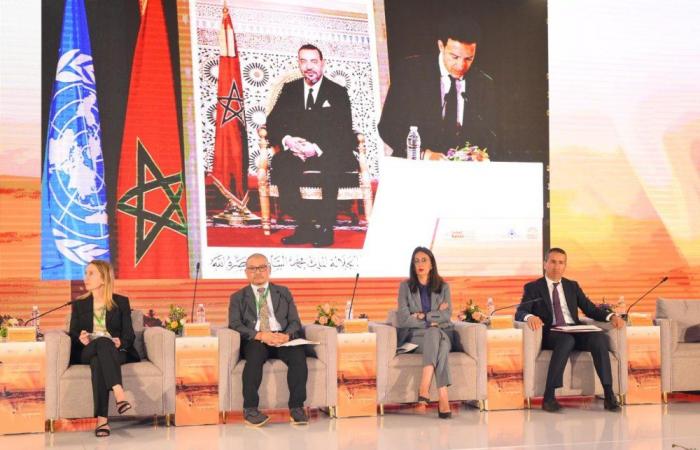that Morocco reaffirms its leading role today in world economic architecture. By welcoming the final meeting of the United Nations special Team on
From May 6 to 9, 2025, the kingdom is not content to organize a technical event. It orchestrates the conclusion of a global process of profound transformation of methods of evaluating
.
A global quest for reliable data in an uncertain economic context
Faced with these uncertainties, the need to have precise and harmonized statistics becomes crucial. Markie MuryawanHead of the Trade & Industry section to the United Nations Statistics Division, insisted on the importance of maintaining transparency in the international trade system: “Without global standards on commercial statistics, it would be impossible for countries to develop national industrial and commercial policiesto engage in multilateral and bilateral commercial negotiations ”.
This vision is shared by the director of the Moroccan exchange office, Driss Benchikhwhich recalled that “the statistics produced and published by The Exchange Officein accordance with international standards in force, are part of the fundamental principles to establish statistics, in particular in terms of quality, transparency, comparability and independence ”.
Morocco, co-president and key player in global statistical renewal
This leadership is part of a national strategy ambitious modernization of the Moroccan statistical system. There Ministre Fettah clearly expressed it: “For Morocco, engaged for several years in a dynamic of deep economic transformation, the development and reliability of our statistical system, in particular in the field of foreign tradeconstitute a strategic priority. We firmly believe that the production of quality dataharmonized, comparable and accessible, is a prerequisite for any effective public policy ”.
The figures bear witness to this growing commercial opening of the kingdom. In a quarter of a century, the total exchange of goods increased from 201.3 billion dirhams in 2000 to 1,217.6 billion dirhams in 2024. As for service exchanges, they almost quintupled between 2004 and 2024, going from 90.1 billion dirhams to 421.6 billion dirhams. This remarkable evolution justifies the particular attention paid by Morocco to the Statistics quality which measure these trade flows.
-Manuals to meet the challenges of a changing world
For his part, Markie Muryawan Has highlighted the new methodological challenges faced by statisticians: “Statistics mean measuring society, and trade is becoming more and more complex. Globalization, digitization … are subjects currently discussed in textbooks, but there are others, such as integration with business statisticsthe impact of trade on environmental sustainability, well-being, societal inclusiveness, etc. ”
The textbooks whose revision is coming to an end are also interested in the Type classification for international trade (CTCI) and the manual on the main indicators of economic and commercial statistics. “The update will also receive the manual on the main indicators of economic and commercial statistics and will be an opportunity to reflect on the revision plan of the standard classification for international trade,” said Driss Benchikh.
The Moroccan exchange office, a model of statistical modernization
This institution has embarked on an ambitious strategy for the 2025-2029 five-year term. As its director detailed, this strategy revolves around four major axes: “Strengthen cooperation with national and international institutions, modernize the data collection system, improve the compilation processes for external exchanges, and widen the policy Open Data of the Changes Office».
The Transformation Digital is at the heart of this modernization. “The exchange office continues the full digitalization of its business processes, establishes a rigorous governance of data and strengthens the security of its information systems By aligning the most demanding international standards, ”said Driss Benchikh.
A Moroccan influence that extends to the African continent
Moroccan expertise in terms of business statistics also benefits other countries, especially in Africa. “As part of the strengthening of cooperation with African countries, meetings have been held between the Exchange Office and the Institute of Statistics of the African Union (Statafric),” said the director of the Office. This cooperation has resulted in access to Morocco foreign trade data Via an EDI channel for the African Union, like what is done with international institutions. In addition, at the request of the IMF, the exchange office has provided technical assistance in the field of statistics of the Payment balance and the overall external position for the benefit of several African countries. “Several African countries have benefited from this assistance,” said Driss Benchikh, citing Niger, Mali, Togo, Chad, Gabon and Mauritania. A delegation from the Republic of Guinea also expressed the vow of being inspired by the Moroccan system to strengthen its capacities in the development of statistics from external exchanges.
Towards a new era of commercial statistics
The adoption of manuals provided for after this Marrakech meeting will mark a decisive step in the evolution of international statistical methods. These documents, the fruit of intense collaborative work since 2021, will serve as a global reference for years to come. “We have made remarkable progress with the right process, the right experts and a spirit of cooperation,” said Markie Milyawan. He added to be “optimistic that at the end of this week, we will have a good discussion and deliberation to guarantee that our MSITS and IMTS text projects will be ready for the world consultation in the coming months”.
For the WTO, the issue is also in size in the face of world trade challenges. Barbara D’Andrea recalled that “we must adopt innovation both in what we measure and in the way we measure it. Megadonia, AI and automatic learning, as well as digital reporting tools have real opportunities to fill information gaps and improve speed and precision. ”








